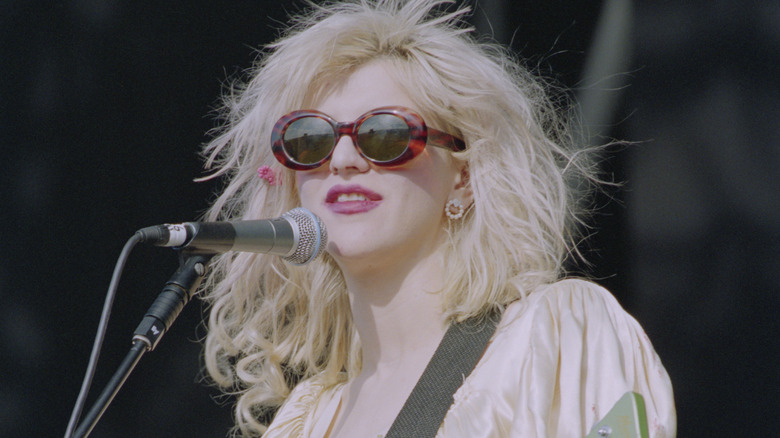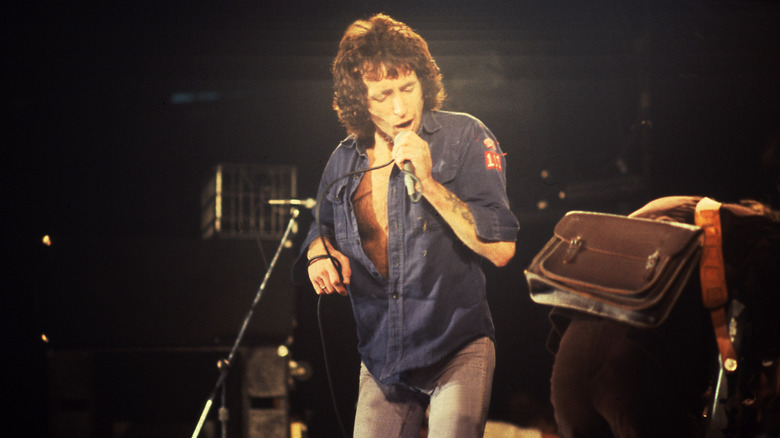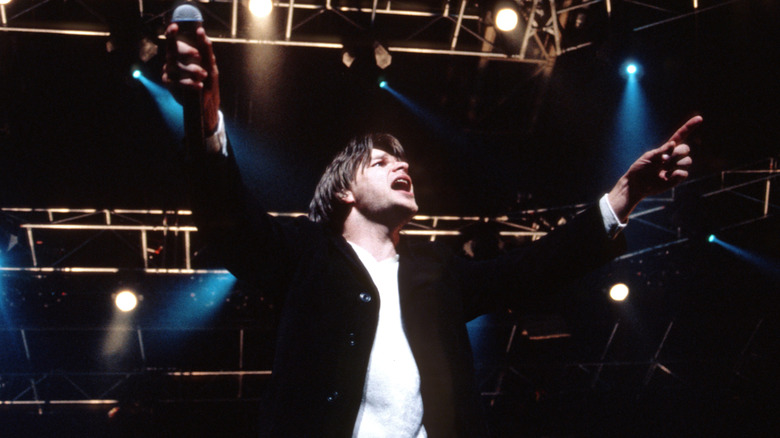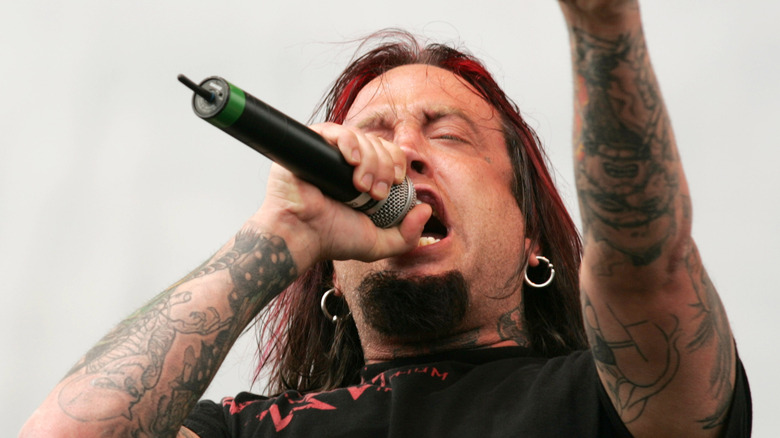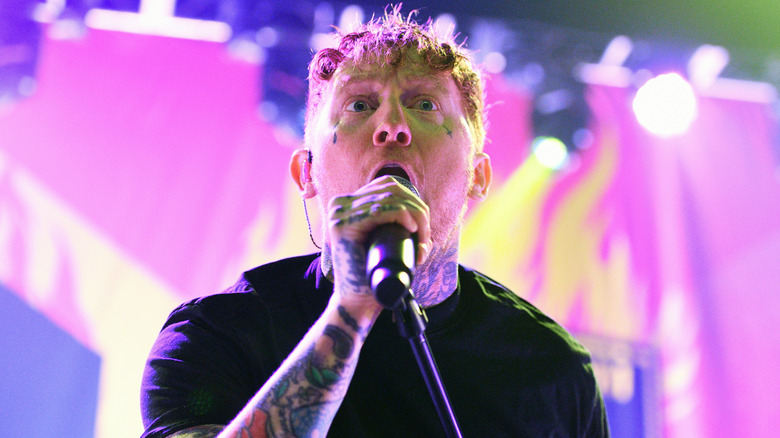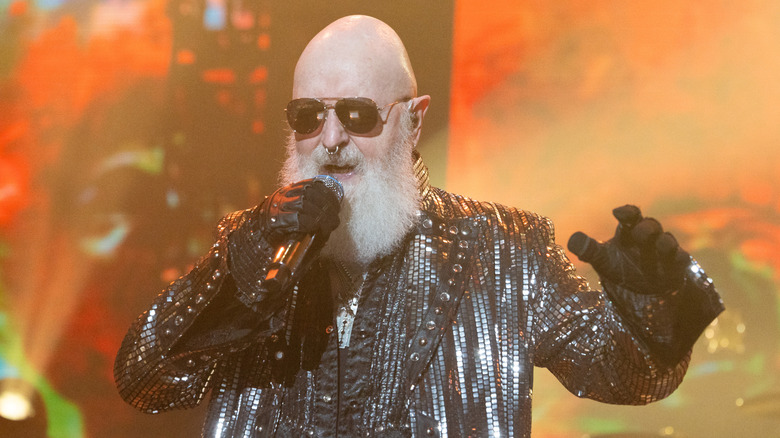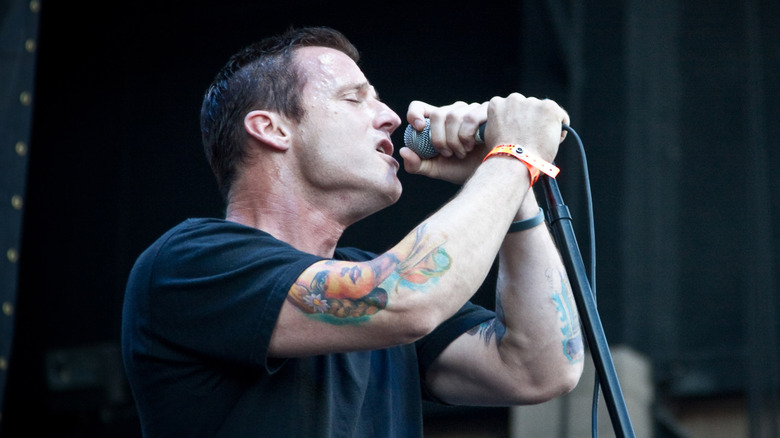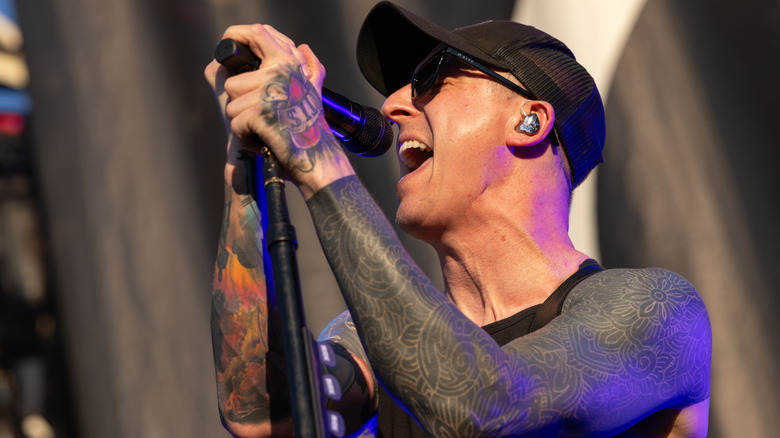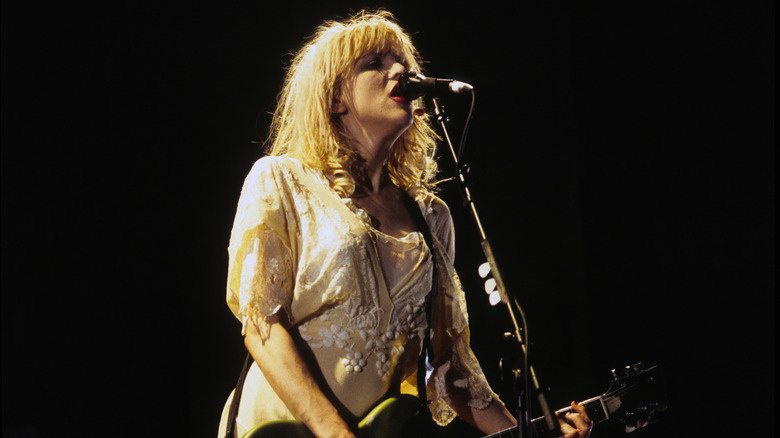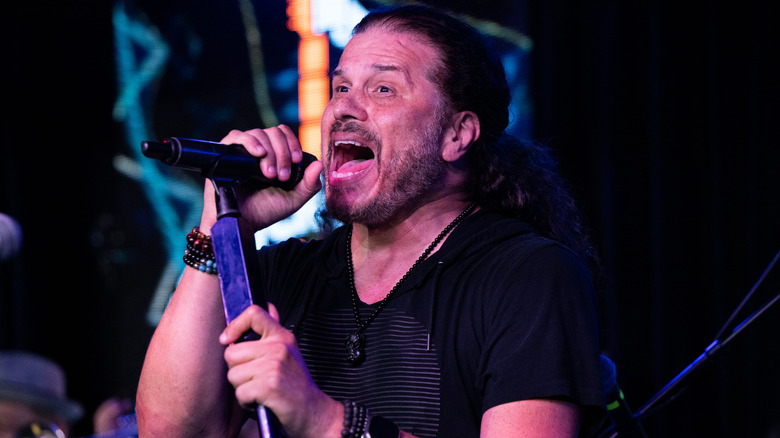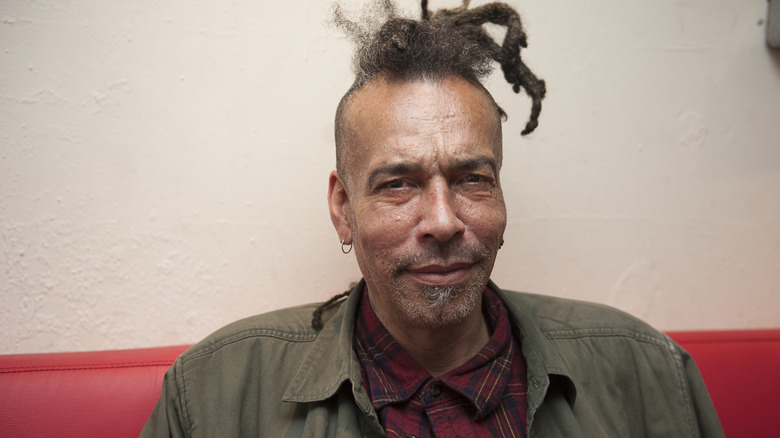Rock Frontman Replacements You Might Not Know Happened
There's nothing more rock 'n' roll than replacing a frontman. After all, this person serves as the voice of the band, so changing up a singer proves to be quite the statement to the audience and music industry as a whole. In some cases, there's no getting around it, such as the tragedy of Linkin Park when Chester Bennington died and the group brought Emily Armstrong into the fray as the new lead vocalist years later. Other times, it's a decision born out of creative frustration between the band members, and a split is necessary to allow all parties to move forward without ripping out each other's throats.
There are many notable rock frontman replacements, such as John Corabi's short stint in Mötley Crüe after Vince Neil's departure and Brian Johnson stepping up to the plate for AC/DC after Bon Scott's death. However, there are also surprising vocalist changes that aren't as highly publicized or even known — except by maybe the most diehard of fans who haunt every forum and website that covers their favorite artists. Yes, more than a few of these fall into the most unfortunate musician replacements in rock history, but there are instances where everyone's favorite singer is actually the replacement for someone else. Shocking, right?
With that said, it's advised that everyone grab a sturdy hard hat or solid helmet as a precaution here, because these facts about the most astonishing rock frontman replacements are about to blow your mind. Let's go!
Bon Scott replaced Dave Evans in AC/DC
For AC/DC fans, there are two eras: Bon Scott and Brian Johnson. Yes, there was that strange period in the 2010s when Johnson didn't perform because of health reasons and the Aussie rock band teamed up with Guns N' Roses' Axl Rose, but let's not talk about that too much. There was another AC/DC vocalist before Scott, though. In fact, he was the original singer for the band between 1973 and 1974: Dave Evans.
As Evans explained to NRK in 2012, the group started gigging and planning songs for their debut album right out of the gate. Unfortunately, there was tension between Evans and the band's then manager, especially after a stint on a tour when the singer's voice gave out and the manager stepped in to do the songs. Then, it all came to a head one day. "We had a night off in Adelaide," Evans said. "We'd all had a few drinks and spoke up, and [the manager] sort of smartmouthed me. I just flew across the room and got stuck into him. The boys pulled us apart, and nobody got hurt. But I left the band then."
Evans completed the tour and departed AC/DC. He was replaced by Scott, whom Evans described as "a nice bloke" and a person who got on well with everyone. The Scott era lasted for six years before Bon Scott's tragic death in 1980 forced AC/DC into another frontman replacement.
Ray Wilson took over from Phil Collins in Genesis
Music fans know the history of how Phil Collins became the singer for Genesis. The drummer took over lead vocals after the departure of Peter Gabriel, and the band didn't look back. While those who want to get deep into the musical trenches can argue over who's the better singer between the pair, there's no disputing Collins' time in Genesis yielded hit songs such as "Land of Confusion" and "I Can't Dance." All good things must come to an end, though, and Phil Collins quit Genesis in 1996 to pursue his solo career.
Genesis replaced Collins with Scottish singer Ray Wilson. Speaking to Rolling Stone in 2022, Wilson explained how he secured the gig. "The first thing [Genesis] did when Phil was leaving was they asked their record company for some ideas, and they were signed to Virgin Records in England," he said. "I was signed to Virgin Records in Germany with [a band named] Stiltskin. The MD of the record company put me forward. He said, 'You should listen to this guy.'" Wilson auditioned and said he thinks he got the role because he sounded a bit like Gabriel, which fit the direction of where the band wanted to go.
With Wilson as a singer, Genesis released the album "Calling All Stations." This version of the group didn't last long. The album was poorly received in the U.S., and they called it a day soon thereafter. Later, Genesis and Collins joined forces for reunion tours.
Jason Gong Jones stepped up for Drowning Pool after Dave Williams' passing
In the early 2000s, no one could escape Drowning Pool's "Bodies." The track became synonymous with nu metal, becoming one of the anthems of the era and appearing absolutely everywhere. Unfortunately, the band's joy was short-lived as frontman Dave Williams died in 2002, joining the tragic club of musicians who died at the age of 30.
In 2003, Jason "Gong" Jones joined Drowning Pool as their new lead singer. Jones contributed to the 2004 album "Desensitized." The biggest single off the album was the track "Step Up," which also featured on "The Punisher" soundtrack, but it was a far cry from the success of "Bodies." Jones left the band in 2005, telling Altitude he was unhappy with the musical direction and what he was paid. Drowning Pool countered this by saying Jones actually owed them money after the band bailed him out of jail.
Soil's Ryan McCombs replaced Jones for a few years before Jasen Moreno took over as vocalist. After Moreno left, McCombs returned to Drowning Pool.
Frank Carter succeeded Johnny Rotten as the voice of the Sex Pistols
The Sex Pistols arrived for a good time, not a long time. Even though the group operated as a full-time band for the briefest of periods, they reunited sporadically throughout the decades for shows. Barking out the lyrics was John Lydon, aka Johnny Rotten, whose ferocious look and hostile demeanor became synonymous with the band and inspired generations of punk rockers.
In 2024, Rotten didn't return for the reunion shows, which may have to do with the fact he was embroiled in a court case with his former bandmates years earlier regarding the use of Sex Pistols songs in the Danny Boyle-directed television series "Pistol." Instead, the band performed with former Gallows frontman Frank Carter under the name Frank Carter and the Sex Pistols.
Speaking about how this union happened to NME, Carter said he met Sex Pistols guitarist Steve Jones in 2007 and they connected over what punk rock means. "Then I eventually met all of them throughout the years," Carter said. "But when I got the call up for this, it was a very special moment. It's still one that I'm cherishing and I feel very grateful for."
Rob Halford is actually Judas Priest's second singer
Did you know that the 2001 film "Rock Star," starring Mark Wahlberg, is loosely based on the story of Tim "Ripper" Owens, who was a fan of Judas Priest and went on to front the band after the departure of Rob Halford? It's the ultimate rock 'n' roll dream story as Owens joined the band he once worshipped.
Even though Owens replaced Judas Priest's famous frontman, Halford wasn't actually the band's first singer. That honor belongs to Al Atkins, who was part of the group from inception in 1969 until 1973. Speaking to the Examiner in 2012, Atkins opened up about his decision to leave the band. He said, "I was the only one in the band that was married with a kid to feed, and without a record deal and the backing we needed I just couldn't survive anymore, so I decided to get a haircut and a 9-to-5 job."
Atkins added that he came to regret his decision, but he was happy to see his former bandmates achieve success with Halford. He also mentioned how Judas Priest wouldn't have sounded like they do had they continued with him, suggesting the music would be more like AC/DC than the galloping heavy metal they're known for.
Zoli Téglás grabbed the mic from Jim Lindberg for Pennywise
Zoli Téglás was no stranger to Pennywise fans. For years, he had performed with the melodic hardcore band Ignite and built up a following for his energetic onstage performances. However, no one could have predicted that he would step in to replace Pennywise's beloved longtime frontman Jim Lindberg.
In 2009, Lindberg shocked the punk rock world by announcing his departure from the band. A year later, he told Alternative Press that "the band just wasn't working anymore. I think we all wanted to do it as long as it was still fun, and we had been having a lot of conflict with touring and the way we had been doing things. It was just kind of difficult for us to get along."
Pennywise announced Téglás as their new vocalist in 2010, and he recorded the album "All or Nothing" with the group. In 2012, Téglás injured his back during a show and required surgery, forcing the group to cancel shows. Lindberg rejoined Pennywise that same year, which according to the band is something that Téglás had been pushing for in the background as well.
John Corsale replaced Brett Scallions as Fuel's new singer
Fuel isn't exactly a name mentioned as one of the most influential rock bands of all time. The group is mostly known for 2000's hit "Hemorrhage (In My Hands)," which is a track that's on everyone's playlist of the best hard rock songs from the era alongside the likes of Creed and Nickelback. Undeniably, the song works because of vocalist Brett Scallions' powerful and raspy delivery of the emotionally charged lyrics. It's safe to say that much like what Ed Kowalczyk is to Live, the same can be said about Scallions and Fuel. Without him, the band sounds like any other rock band.
In 2007, Toryn Green was announced as the new singer for Fuel after Scallions left the band to join Riders on the Storm — the project put together by the Doors' Robby Krieger and Ray Manzarek. Scallions rejoined a reincarnation of Fuel in 2010; however, he left once again in 2020.
Fuel continued with a new singer in the form of John Corsale. However, this proved to be a blink-and-you-miss-it moment as he was quietly replaced by a former contestant on "The Voice," Aaron Scott.
Ryan Key wasn't Yellowcard's first frontman
When talking about early 2000s pop punk, it's impossible to not mention Yellowcard, who slotted themselves comfortably next to other hard-hitters like Good Charlotte and Sum 41. Yes, the addition of a violin in their sound makes them stand out, but their music is also aided by Ryan Key's distinct voice and songwriting ability.
It could have turned out much differently had Yellowcard stuck with their original lead singer, Ben Dobson. As guitarist Benjamin Harper told VWMusic, most of the members of Yellowcard met in high school around 1997 and played a faster, more aggressive style of punk with Dobson as the voice of the group. After two albums with Dobson, the group parted ways with their vocalist, and Key hopped on board. With that came a new sound too.
"We had Ben and Todd [Clary]," Harper said, "but, to be honest, Todd's instrumental writing was a big part of early Yellowcard's sound, and when Ryan Key joined, he became the main songwriter, which also fitted in the violin more."
Kasabian's Serge Pizzorno took over all vocal duties from Tom Meighan
Kasabian contributed to the indie rock explosion of the 2000s, though band member Serge Pizzorno might fight anyone over that categorization of their sound. Unquestionably, vocalist and co-founder Tom Meighan played his role in getting the group noticed and formed a part of Kasabian's biggest moments for over two decades. In 2020, Meighan was handed his marching orders after he admitted to assaulting his ex-fiancee. The band released a statement (via BBC) discussing how "heartbroken" they were with what happened, adding, "As soon as we found out about the charges made against Tom, we as a band made the decision that we could no longer work with him."
Instead of hiring a new crooner, Pizzorno shifted to the frontman position permanently. He had already contributed backing vocals in the years prior, but now he assumed all singing duties. Speaking to The Guardian in 2024, Pizzorno admitted he is "not an extrovert," but he's found power in adapting to the role of a frontman by how he presents himself on stage. He said, "It probably sounds silly, but once I put on an outfit, I know I can do it, even if sometimes I don't feel I can."
If you or someone you know is dealing with domestic abuse, you can call the National Domestic Violence Hotline at 1−800−799−7233. You can also find more information, resources, and support at their website.
Courtney Love had a blink-and-you-miss-it stint in Faith No More
Faith No More has had no shortage of vocalists in the band's history, though the two singers most notably associated with the act are Chuck Mosley and Mike Patton. In the early 1980s, the group ran the gauntlet in order to find the right personality after parting ways with original vocalist, Mike Morris. One of the musicians who performed with Faith No More was none other than Courtney Love.
Speaking to Classic Rock, keyboardist Roddy Bottum showered Love with praise, stating, "She sang with us for probably six months. She was an awesome performer; she liked to sing in her nightgown, adorned with flowers." While she had the perfect rock 'n' roll aura and stage presence, Faith No More bassist Billy Gould admitted that Love was "a lot of work" and her "chaotic personality" prevented them from moving forward with her in the long term.
Not long after that, Mosley would join Faith No More as a singer on a permanent basis. Things turned out more than okay for Love as she went on to form the acclaimed alternative rock band Hole and become a celebrity in her own right.
Jeff Scott Soto made a brief stop through the revolving musical door known as Journey
Look through Journey's history and it's been quite the journey — pardon the pun. So many people have gone in and out of the band that every person reading this needs to question if they, too, may have been a member of the rock group once upon a time. Since 2007, Arnel Pineda has served as the frontman for the band. But who did he replace? That depends who you ask, because the band's website skipped over Jeff Scott Soto's stint from 2006 to 2007 after he replaced Steve Augeri.
Speaking to "The RobbCast Podcast" (via Blabbermouth), Soto mentioned how it stings to be erased from history. "I was in the background listening to Neal [Schon] doing interviews when we were doing the European tour, saying I was their new singer and that we could finally get past the ghost of Steve Perry and blah blah blah," Soto said. "I was there, and I heard all of that. And to not have that acknowledgement now, it just hurts."
Schon addressed the issue in a Facebook comment under an article, saying that Soto helped Journey to finish a tour with Def Leppard, but he failed to convince the band he was the right singer for them. In Schon's words, "It didn't work out."
Chuck Mosley joined Bad Brains to replace H.R.
Think Bad Brains, and only one vocalist comes to mind: H.R. The musician solidified himself as the frontman of the hardcore punk band — and despite a few other singers zipping in and out of the band over the years, H.R. remains the most iconic voice of the bunch.
During one of the stints when H.R. departed Bad Brains in 1990, Chuck Mosley of Faith No More fame stepped into the lead singer's role for a short period. His time with the band might have only been brief, but Mosley found it valuable for his growth as a vocalist. "I wasn't really good at singing," he told Metal Insider, "but being in the Bad Brains taught me [to] focus on being a singer and taking myself a little more seriously as a singer than I ever did."
From 1990 to 1992, Mosley performed around 60 shows with Bad Brains, but he never recorded an album with the band. He was replaced as a frontman by Israel Joseph I, who then made way for H.R. a few years later. Mosley died at the age of 57 in 2017.
